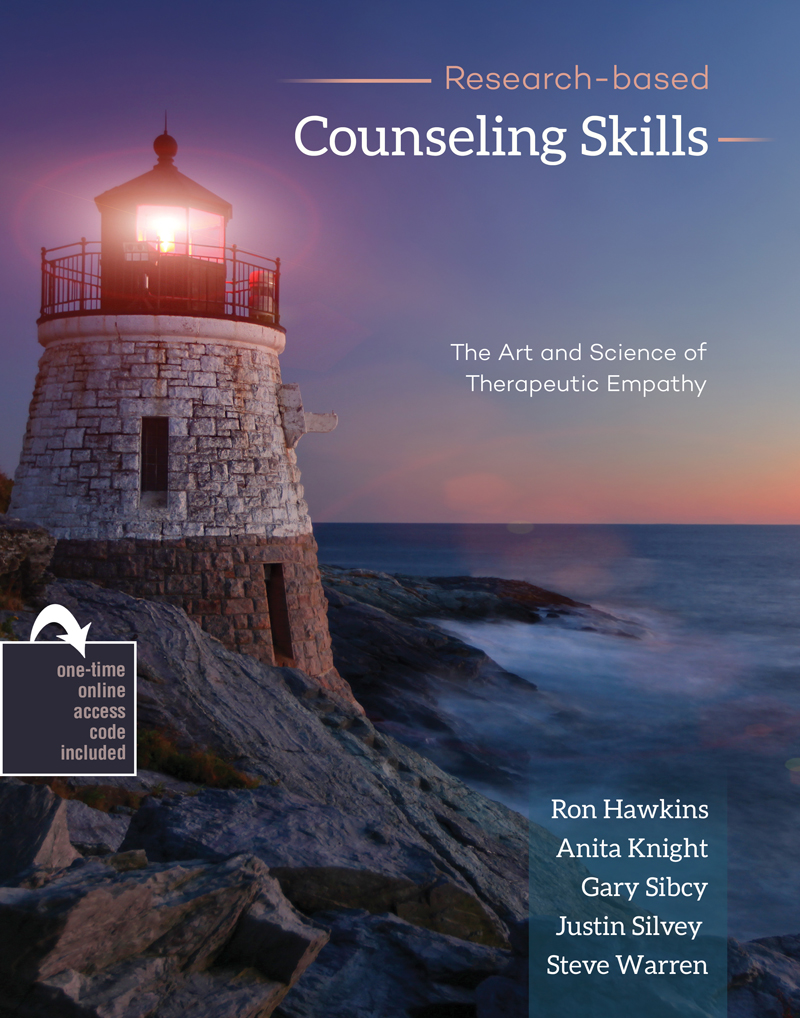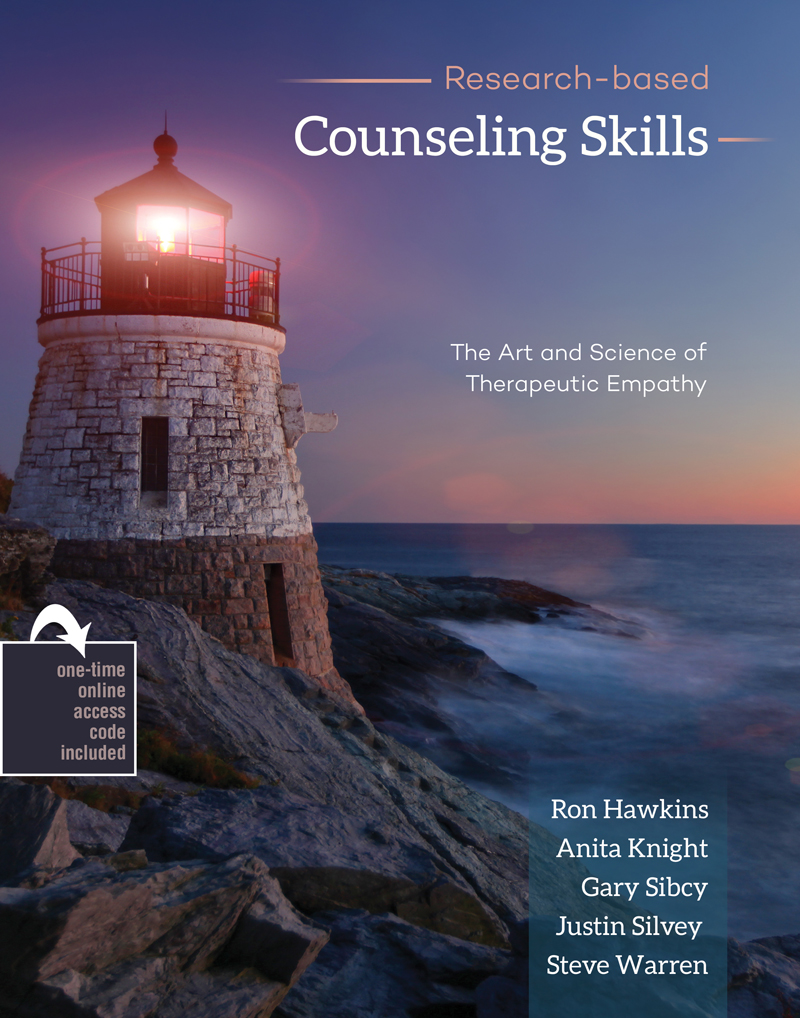Research-Based Counseling Skills: The Art and Science of Therapeutic Empathy
Author(s): Anita M. Knight Kuhnley , Gary A. Sibcy II , Steve E. Warren , Ronald E. Hawkins
Edition: 1
Copyright: 2018
Edition: 1
Copyright: 2018
Choose Your Format
Choose Your Platform | Help Me Choose
Research-based Counseling Skills: The Art and Science of Therapeutic Empathy provides a toolbox of evidence-based counseling skills and techniques providing developing counselors with a roadmap on the journey of becoming clinical experts. Counseling skills that build a strong foundation for therapeutic rapport and safety including the listening skill sequence, empathy as an umbrella skill, and more advanced skills such as immediacy goalsetting, and challenging skills are explored. The skills are discussed through the lens of attachment theory and counseling as an attachment holding environment, the importance of providing a safe haven and secure base are emphasized through the identification of specific strategies to create safety.
Acknowledgements
Part One: Foundations
Inspiration: Integration of Faith in Counseling
1. Theoretical Foundations (Sibcy and K )
Chapter Overview
The Emergent Model of Clinical Expertise in Counseling and Psychotherapy
Attachment Theory
Unresolved (or Disorganized) for Loss
Redeeming Attachment
Attachment in Scripture
Attachment Styles and Pathology
Charting the Course Forward
Skills and Future Coursework
Recommended Reading
Chapter Summary
2. The Journey of Becoming (Silvey and K )
Chapter Overview
Understand Your Why
Attachment Illumination
Ethical and Spiritual Implications of Self-Care
Belief and Hope
Self-Evaluation
QTIP or Openness to Feedback and Direction (Opportunities for Growth in Your Journey)
The Role of Supervision and Consultation on the Journey
Spiritual Implications for the Journey of Becoming
Recommended Reading
Chapter Summary
3. Intentional and Advanced Empathy (K , Sibcy, and Gantt)
Chapter Overview
Defining Empathy
A Special Set of Communication Ingredients
Attachment Illumination: Attachment and Empathy
Communicating Empathy via the Skills
Recommended Reading
Chapter Summary
Part Two: Demonstrating Evidence of Listening with Core Skills: Seeking to Understand
4. Habits of Effective Counselors (Silvey and K )
Chapter Overview
Defining Effectiveness
Spiritual Implications of Developing Habits
What We Know About Habits
The Literature on Factors that May Influence Counselor Efficacy
Attachment Illumination
Trends in Counseling
Example of New Tools in Your Toolbox
Spiritual Implications
Attachment Illumination
Recommended Reading
Chapter Summary
5. Ethical Informed Consent, Suicide Risk Assessment, and Using Technology in Counseling (Kuhnley)
Chapter Overview
Ethical Informed Consent
Clients’ Rights to Treatment
Breaching Confidentiality
Mandated Reporting
Prevention and Intervention
Threats of Suicide and Homicide
Ethical and Culturally Relevant Strategies for Establishing and
Maintaining In-Person and Technology-Assisted Relationships (CACREP II.F.5.d)
Recommended Reading
Chapter Summary
6. The Posture of Listening: Nonverbal Counseling Skills (K and Warren)
Chapter Overview
Why Are Nonverbal Skills Important?
The Nonverbal Behavior of Counselors
Spiritual Implications
Universality
Nonverbal Behavior and Worldview
Attachment Research on Presence
How Do Family Interactions Inform the Importance of Nonverbal Congruence?
Congruence
Facial Expressions
Necessary But Not Sufficient
Practice Activity
An Important Note
Best Practices in Nonverbal Communication
SOLER
Caveats
Practice Activity
Recommended Reading
Chapter Summary
7. Paralanguage and Minimal Encouragers (K and Sibcy)
Chapter Overview
What Is Paralanguage?
Helping Clients Overcome Blocks to Self-Disclosure
Facilitating Storytelling
Minimal Encouragers: Being Present in the Conversation
Recommended Reading
Chapter Summary
Contents
8. Reflection of Content, Paraphrasing, and Summarizing (K and Sibcy)
Chapter Overview
Reflecting Skills
Enriching and Paraphrasing
Summarizing
Recommended Reading
Chapter Summary
9. Reflecting and Exploring Feelings (K and Sibcy)
Chapter Overview
Where does Reflecting Feelings Fit in with the Other Skills?
Feelings and Emotion Dysregulation: Depression and Cognitive Behavioral Analysis System of Psychotherapy
The Etiology of Persistent Depression
Felt Safety
Attachment Illumination
Milestones Along the Journey
Multicultural Considerations
Exploring Feelings
The Structure of a Reflection of Feeling
Multicultural Considerations
Recommended Reading
Chapter Summary
Part Three: Advanced Skills and Advanced Techniques
10. The Art and Science of Questions (K and Sibcy)
Chapter Overview
Questions in Social Conversation versus Questions in Therapeutic Dialogue
Recommended Reading
Chapter Summary
11. Reflecting Meaning (K and Sibcy)
Chapter Overview
Reflecting Meaning
A Key Player in Meaning Making
Contents
Attachment Illumination
Recommended Reading
Chapter Summary
12. Challenging Skills and Immediacy (K and Sibcy)
Chapter Overview
Reframing Confrontation
Attachment Illumination
Defining Immediacy
Recommended Reading
Chapter Summary
13. Case Conceptualization, Scaling, and Preliminary Goal Setting (Sibcy and K )
Chapter Overview
Case Conceptualization
Scaling
Conceptualizing Change Based on Theory: Secure Model of Change
SMART Goals
Agreement on Treatment Methods
Other Advanced Skills
Collaborative Homework
Recommended Reading
Chapter Summary
Part Four: Looking to the Future, Adapting to a Multicultural Us, and Preparing to Work as Part of Integrative Care
14. Strategies for Preparing for Termination (K and Sibcy)
Chapter Overview
Preparing Our Hearts for Facing the End
Preparing Our Clients for Termination
Avoiding Premature Termination
Termination and Loss
Attachment Illumination: Transitional Objects
What Is a TO?
Attachment Illumination
The Case of Monica
Contents
Recommended Reading
Chapter Summary
15. Multicultural Considerations for Counseling Skills (Moitinho)
Chapter Overview
Key Essential Multicultural Considerations
Understanding Culture
Multicultural Counseling
Attachment Illumination
Core Skills in Multicultural Counseling
Reflecting Skills
Multicultural Counseling Considerations and Telemental Health
Recommended Reading
Chapter Summary
16. What Counselors Need to Know about Psychopharmacology: What to Listen for (Kuhnley)
Chapter Overview
Psychopharmacology
Attachment Illumination
Medications
Most Prescribed Psychiatric Drugs for 2016
Four Major Domains of Diagnosis and Relevant Medications
Recommended Reading
Chapter Summary
References
Glossary
Anita Knight Kuhnley, Ph.D. is Associate Professor of Counseling and a Licensed Professional Counselor (LPC) in the Department of Counselor Education and Family Studies at Liberty University, she teaches in the CACREP accredited clinical mental health counseling program. Kuhnley earned her doctorate in Counselor Education and Supervision from Regent University and her M.A. in Community Counseling from Regent University. Kuhnley is also a certified as a highly reliable coder of the Adult Attachment Interview (AAI) through Mary Main and Eric Hesse’s UC Berkeley AAI coder certification program. Kuhnley is also the author of several books including Redeeming Attachment. For more information see her website at: https://dranitakuhnley.com/. Her forthcoming trade book releases in September of 2020 and is entitled, “The Mister Rogers Effect: Seven secrets to bringing out the best in yourself and others from America’s beloved neighbor.”
Research-based Counseling Skills: The Art and Science of Therapeutic Empathy provides a toolbox of evidence-based counseling skills and techniques providing developing counselors with a roadmap on the journey of becoming clinical experts. Counseling skills that build a strong foundation for therapeutic rapport and safety including the listening skill sequence, empathy as an umbrella skill, and more advanced skills such as immediacy goalsetting, and challenging skills are explored. The skills are discussed through the lens of attachment theory and counseling as an attachment holding environment, the importance of providing a safe haven and secure base are emphasized through the identification of specific strategies to create safety.
Acknowledgements
Part One: Foundations
Inspiration: Integration of Faith in Counseling
1. Theoretical Foundations (Sibcy and K )
Chapter Overview
The Emergent Model of Clinical Expertise in Counseling and Psychotherapy
Attachment Theory
Unresolved (or Disorganized) for Loss
Redeeming Attachment
Attachment in Scripture
Attachment Styles and Pathology
Charting the Course Forward
Skills and Future Coursework
Recommended Reading
Chapter Summary
2. The Journey of Becoming (Silvey and K )
Chapter Overview
Understand Your Why
Attachment Illumination
Ethical and Spiritual Implications of Self-Care
Belief and Hope
Self-Evaluation
QTIP or Openness to Feedback and Direction (Opportunities for Growth in Your Journey)
The Role of Supervision and Consultation on the Journey
Spiritual Implications for the Journey of Becoming
Recommended Reading
Chapter Summary
3. Intentional and Advanced Empathy (K , Sibcy, and Gantt)
Chapter Overview
Defining Empathy
A Special Set of Communication Ingredients
Attachment Illumination: Attachment and Empathy
Communicating Empathy via the Skills
Recommended Reading
Chapter Summary
Part Two: Demonstrating Evidence of Listening with Core Skills: Seeking to Understand
4. Habits of Effective Counselors (Silvey and K )
Chapter Overview
Defining Effectiveness
Spiritual Implications of Developing Habits
What We Know About Habits
The Literature on Factors that May Influence Counselor Efficacy
Attachment Illumination
Trends in Counseling
Example of New Tools in Your Toolbox
Spiritual Implications
Attachment Illumination
Recommended Reading
Chapter Summary
5. Ethical Informed Consent, Suicide Risk Assessment, and Using Technology in Counseling (Kuhnley)
Chapter Overview
Ethical Informed Consent
Clients’ Rights to Treatment
Breaching Confidentiality
Mandated Reporting
Prevention and Intervention
Threats of Suicide and Homicide
Ethical and Culturally Relevant Strategies for Establishing and
Maintaining In-Person and Technology-Assisted Relationships (CACREP II.F.5.d)
Recommended Reading
Chapter Summary
6. The Posture of Listening: Nonverbal Counseling Skills (K and Warren)
Chapter Overview
Why Are Nonverbal Skills Important?
The Nonverbal Behavior of Counselors
Spiritual Implications
Universality
Nonverbal Behavior and Worldview
Attachment Research on Presence
How Do Family Interactions Inform the Importance of Nonverbal Congruence?
Congruence
Facial Expressions
Necessary But Not Sufficient
Practice Activity
An Important Note
Best Practices in Nonverbal Communication
SOLER
Caveats
Practice Activity
Recommended Reading
Chapter Summary
7. Paralanguage and Minimal Encouragers (K and Sibcy)
Chapter Overview
What Is Paralanguage?
Helping Clients Overcome Blocks to Self-Disclosure
Facilitating Storytelling
Minimal Encouragers: Being Present in the Conversation
Recommended Reading
Chapter Summary
Contents
8. Reflection of Content, Paraphrasing, and Summarizing (K and Sibcy)
Chapter Overview
Reflecting Skills
Enriching and Paraphrasing
Summarizing
Recommended Reading
Chapter Summary
9. Reflecting and Exploring Feelings (K and Sibcy)
Chapter Overview
Where does Reflecting Feelings Fit in with the Other Skills?
Feelings and Emotion Dysregulation: Depression and Cognitive Behavioral Analysis System of Psychotherapy
The Etiology of Persistent Depression
Felt Safety
Attachment Illumination
Milestones Along the Journey
Multicultural Considerations
Exploring Feelings
The Structure of a Reflection of Feeling
Multicultural Considerations
Recommended Reading
Chapter Summary
Part Three: Advanced Skills and Advanced Techniques
10. The Art and Science of Questions (K and Sibcy)
Chapter Overview
Questions in Social Conversation versus Questions in Therapeutic Dialogue
Recommended Reading
Chapter Summary
11. Reflecting Meaning (K and Sibcy)
Chapter Overview
Reflecting Meaning
A Key Player in Meaning Making
Contents
Attachment Illumination
Recommended Reading
Chapter Summary
12. Challenging Skills and Immediacy (K and Sibcy)
Chapter Overview
Reframing Confrontation
Attachment Illumination
Defining Immediacy
Recommended Reading
Chapter Summary
13. Case Conceptualization, Scaling, and Preliminary Goal Setting (Sibcy and K )
Chapter Overview
Case Conceptualization
Scaling
Conceptualizing Change Based on Theory: Secure Model of Change
SMART Goals
Agreement on Treatment Methods
Other Advanced Skills
Collaborative Homework
Recommended Reading
Chapter Summary
Part Four: Looking to the Future, Adapting to a Multicultural Us, and Preparing to Work as Part of Integrative Care
14. Strategies for Preparing for Termination (K and Sibcy)
Chapter Overview
Preparing Our Hearts for Facing the End
Preparing Our Clients for Termination
Avoiding Premature Termination
Termination and Loss
Attachment Illumination: Transitional Objects
What Is a TO?
Attachment Illumination
The Case of Monica
Contents
Recommended Reading
Chapter Summary
15. Multicultural Considerations for Counseling Skills (Moitinho)
Chapter Overview
Key Essential Multicultural Considerations
Understanding Culture
Multicultural Counseling
Attachment Illumination
Core Skills in Multicultural Counseling
Reflecting Skills
Multicultural Counseling Considerations and Telemental Health
Recommended Reading
Chapter Summary
16. What Counselors Need to Know about Psychopharmacology: What to Listen for (Kuhnley)
Chapter Overview
Psychopharmacology
Attachment Illumination
Medications
Most Prescribed Psychiatric Drugs for 2016
Four Major Domains of Diagnosis and Relevant Medications
Recommended Reading
Chapter Summary
References
Glossary
Anita Knight Kuhnley, Ph.D. is Associate Professor of Counseling and a Licensed Professional Counselor (LPC) in the Department of Counselor Education and Family Studies at Liberty University, she teaches in the CACREP accredited clinical mental health counseling program. Kuhnley earned her doctorate in Counselor Education and Supervision from Regent University and her M.A. in Community Counseling from Regent University. Kuhnley is also a certified as a highly reliable coder of the Adult Attachment Interview (AAI) through Mary Main and Eric Hesse’s UC Berkeley AAI coder certification program. Kuhnley is also the author of several books including Redeeming Attachment. For more information see her website at: https://dranitakuhnley.com/. Her forthcoming trade book releases in September of 2020 and is entitled, “The Mister Rogers Effect: Seven secrets to bringing out the best in yourself and others from America’s beloved neighbor.”




